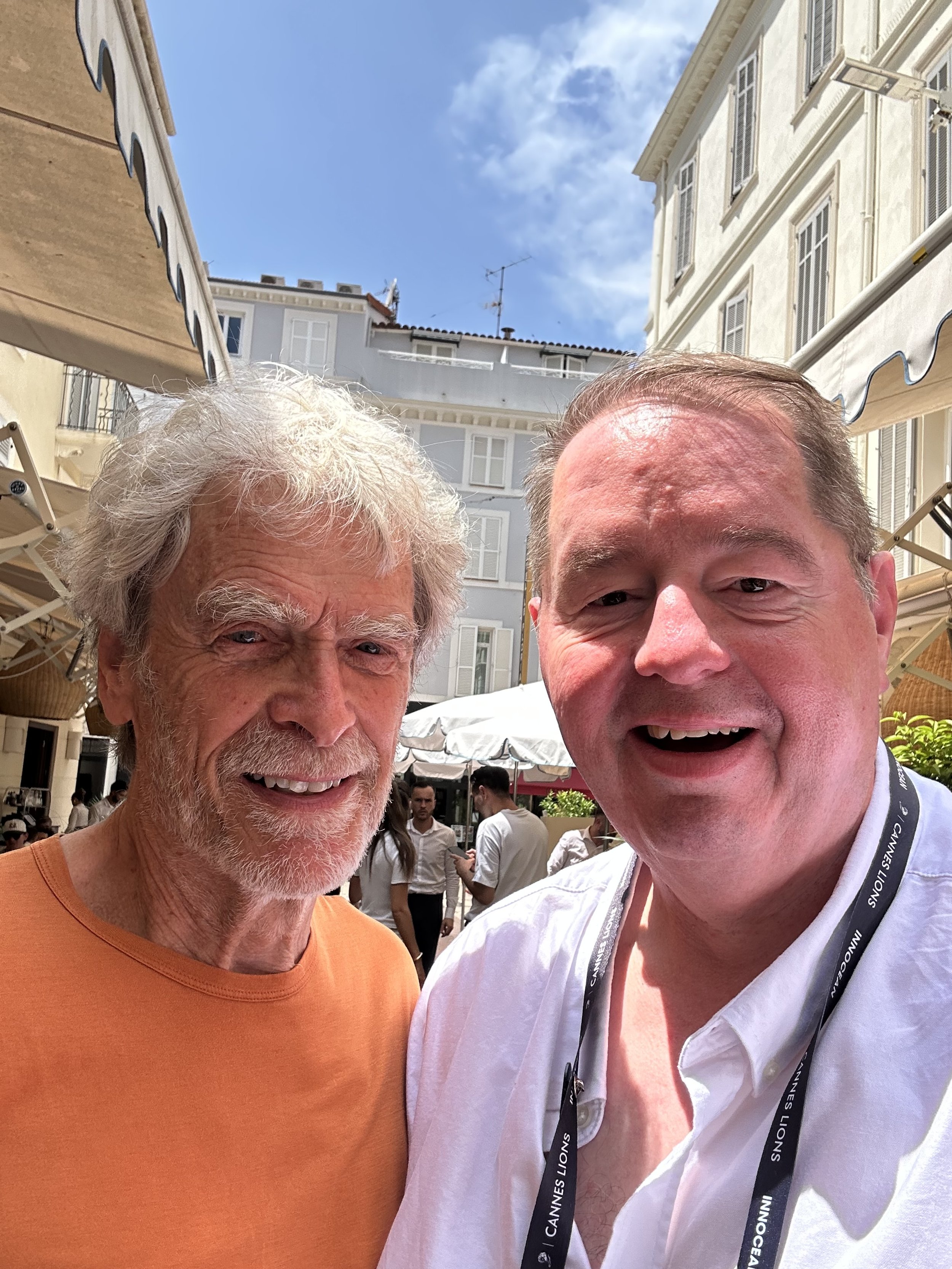The British Interactive Media Association
I am now a member of BIMA, the British Interactive Media Association, the voice of tech and creativity.
I am really pleased to announce that I have joined BIMA, the British Interactive Media Association. BIMA is the voice of tech and creativity and I’m looking forward to being a part of the association.
Cannes Lions 2025: Hegarty Warns “Giants Can’t Dance” Without Cultural Courage
Stay ahead with Sir John Hegarty’s insights at Cannes Lions 2025. Discover how marketing and creativity must evolve to thrive in the AI landscape.
Sir John Hegarty and me at Cannes Lions 2025
At Cannes Lions 2025, Sir John Hegarty returned to the Croisette with a provocation that cut through the AI noise with characteristic clarity: size is no longer a competitive advantage—creativity is. Addressing a packed audience, the BBH co-founder made the case that legacy institutions are structurally ill-equipped to thrive in the AI era unless they undergo radical cultural reinvention.
“It’s not the big that beat the small or the small that beat the big. It’s the bold that beat the bureaucratic.”
This central thesis—delivered with Hegarty’s signature wit and steel—has clear implications for CMOs and agency leaders. As WARC has previously reported, organisational agility and creative bravery are outperforming traditional scale economics (a). Hegarty’s framework clarifies why bureaucracy and process, once the hallmark of durable enterprise, are now liabilities in a landscape shaped by speed, signal, and strategic improvisation.
The Collapse of the Creative Pyramid
Hegarty contended that the traditional triangle of leadership—where decision-making is concentrated at the top—is outdated. Instead, he offered the metaphor of the inverted triangle, where leadership serves from below, unlocking the distributed creativity of the organisation.
In the age of AI, everyone becomes a creative director. That shift necessitates more than upskilling—it demands a wholesale rethinking of structure, culture, and philosophy.
AI as Collaborator, Not Tool
Rejecting the reductive view of AI as a “tool,” Hegarty framed it as a collaborator. This nuance matters: AI can preserve and evolve founding philosophies, keeping a brand’s original vision relevant long after its originator is gone.
“Maybe one of the functions of AI is that the founder never dies.”
This reframing invites serious consideration from brand stewards. If AI can embody the sensibility and philosophy of a company’s origins—Chanel, Ford, Apple—then strategic brand leadership must shift from protecting the past to actively operationalising it in real-time.
Rebuilding from First Principles
For Hegarty, the path forward for large enterprises lies in rediscovering and reactivating their original philosophy. This rebuilding from first principles is not a nostalgic exercise. It is strategic regeneration. As he put it:
“Go back to what built you.”
This approach aligns with a trend WARC has observed in post-pandemic brand strategy: a return to essential values, often codified in founding principles, used as a compass for navigating transformation (b).
Hegarty cited Patagonia, Oatly, and Apple as examples of brands whose philosophies were not marketing lines but business doctrines—creatively interpreted through product, communications, and culture.
The Strategic Imperative for Brands
Hegarty’s presentation was a call to action, particularly for global brands under pressure to remain culturally relevant in a fragmented, AI-powered landscape. His advice:
Rethink structure: Flip hierarchies to empower bottom-up creativity.
Rediscover your philosophy: Make it central to innovation and brand behaviour.
Use AI to scale culture, not just content.
Stop aiming to be the biggest. Start aiming to be the boldest.
Final Thought
Sir John Hegarty may be a familiar voice at Cannes, but his message this year felt newly urgent. For organisations struggling to keep pace, his challenge was simple: either dance or die. And in the AI era, the pace is only accelerating.
I have recently completed the Creativity for Growth Course. It was a brilliant opportunity for insight and learning from an industry legend.
Sources:
(a) Building Belief: What It Takes to Instill a Culture of Creative Effectiveness
(b) WARC Asian Strategy Report: Staying relevant amidst changing tides
Published on June 25, 2025, at anthonykennedy.com
Exploring the Impact of Generative AI on Marketing Creativity
With the rise of generative AI, the marketing industry is at a turning point, where AI has the potential to speed up creativity, provide new inspiration, and generate unique ideas. However, the industry must also be aware of the limitations and risks associated with using generative AI.
With the rise of generative AI, the marketing industry is at a turning point, where AI has the potential to speed up creativity, provide new inspiration, and generate unique ideas. However, the industry must also be aware of the limitations and risks associated with using generative AI. My latest article on Forbes, "Is Marketing Creativity at Risk? Ask Generative AI," discusses the benefits and pitfalls of AI for marketers, offering insights into how to leverage AI tools effectively while mitigating risks.






